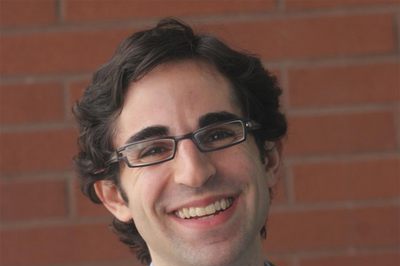While Jewish-American culture of the late 20th century often rejected (or merely ignored) LGBT culture, according to Warren Hoffman the first half of the century was more forgiving.
In his new book, “The Passing Game: Queering Jewish American Culture,” the openly gay author explores queer Jewish identity in 20th-century American literature, drama and film.
For Hoffman, who has a Ph.D. in literature from the University of California-Santa Cruz and teaches Jewish-American literature and musical theater at Temple University, the idea for the book came about while he was working on his dissertation.
“I was coming out while a grad student in Jewish-American literature,” he said. “Those two things were in my mind at the same time. I was reading all of these very classic texts and watching all these movies in this particular mindset. The point of the book is to look at LGBT Jewish cultural texts before Stonewall. I was really interested in how people even talked about and viewed gay identity in this earlier time period. The book starts in 1907 with Yiddish text, this sort of Yiddish lesbian play, and it goes up to the years around Stonewall, around 1969.”
The early Yiddish works Hoffman references in “The Passing Game” include the 1907 play “God of Vengeance” by Sholem Asch, the films of Yiddish actor Molly Picon and stories by Isaac Bashevis Singer. The plot of “God of Vengeance” involved a lesbian relationship, Picon was known to cross-dress in her films and Singer explored issues of identity and gender roles in his stories.
“What is interesting is that Yiddish culture actually seemed more open to what we might term queer identity, in part because we were dealing with a time period in which this idea that gay identity and homosexuality was something terrible didn’t really exist in the Yiddish community,” he said. “So these things could develop in Yiddish texts and there wasn’t anything to say that this was something bad.”
Hoffman said that views toward queer culture changed with the rise of English-language novels aimed at Jewish-American readers, like Abraham Cahan’s “The Rise of David Levinsky” and Jo Sinclair’s “Wasteland.” Hoffman points out that the characters in these works of literature are trying to make themselves into the norm of white, straight Americans.
“Texts coming out in English seemed to say, basically, if you want to be Jewish, anything that smacked of queer sexuality was wrong and if you wanted to be a good Jewish American, you should cast that aside,” he said. “You’re dealing with people in this time period that were probably fluent in both languages themselves. For Jewish audiences, the idea of homosexuality and queer sexuality wasn’t a problem for them. The bigger concern for them was the American public. If they’re trying to assimilate, the idea was if we want to be accepted, then we don’t want to have anything that is going to associate us with homosexuality.”
Hoffman said “The Passing Game” gives readers insight into how LGBT culture was viewed rather than how Jewish Americans deal with LGBT issues today.
“One thing that the book tries to look at is that today, many people who are LGBT and were born or raised Jewish don’t really identify as being Jewish,” he said. “Part of what that book looks at is sort of the opposite: that being Jewish is important and you get these quasi-LGBT issues that no one wants to talk about. I think it has a lot to do with the time period in which we’re dealing.”
Hoffman added that despite the sometimes-common disconnect between Jewish and LGBT culture, many gay Jewish Americans are trying to find a balance between the two.
“LGBT Jews are looking for acceptance and inclusion in the larger Jewish community,” he said. “For me that’s important, and things have definitely been changing along those lines in recent years to make that possible.”
Warren Hoffman hosts a reading at 5:30 p.m. May 21 at Giovanni’s Room, 345 S. 12th St. For more information, call (215) 923-2960.
Larry Nichols can be reached at [email protected].

